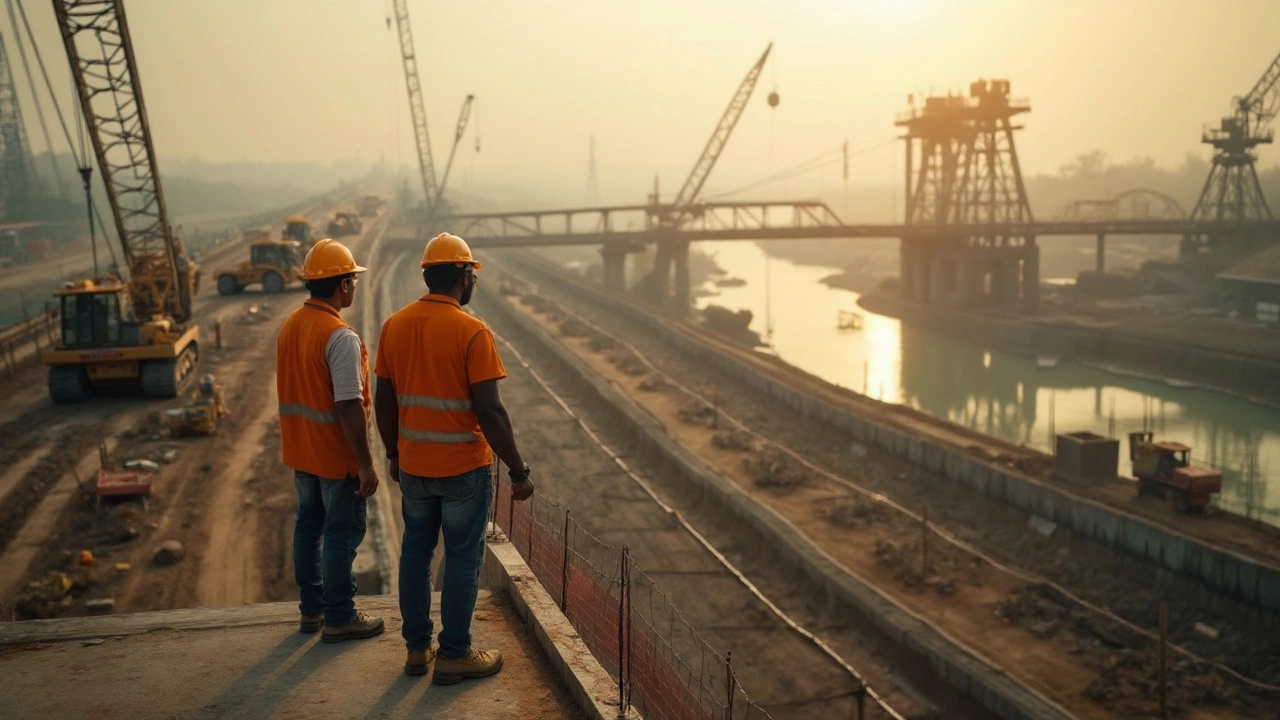Only a handful of industries let you drive past your legacy every day. Look around Auckland, or any city for that matter, and rising steel and glass tell the story: construction has muscle—and money—built into its bones. But which job in this tough, dynamic field actually puts the most coin in your pocket? If you picture sweaty workers in hard hats, you're just scratching the surface. The answer might surprise more than a few people on site and off.
Why Construction Salaries Keep Climbing
It’s not just about swinging a hammer or pouring concrete anymore. Construction has evolved, and so have the paychecks. What’s got salaries moving up? A mix of serious investment in infrastructure, a wild shortage of skilled workers, and projects getting bigger, longer, and far more complex. The digital revolution didn’t skip construction, either—tech runs big projects now, and that comes with price tags and pay bumps.
Did you know that, in 2024, the New Zealand government announced an additional $14 billion for public works? That means more projects and a hunt for talent that’s driving up wages, especially for those who can handle responsibility. Auckland’s CRL (City Rail Link) alone clocks in as the country’s largest ever infrastructure job, with budgets and teams that’d make your eyes water. Managing these jobs takes more than brawn—you need the business sense of a CEO and nerves of steel.
A shortage of qualified people is another big reason pay is on the rise. Trades like carpentry and plumbing are crying out for new blood, but so are the technical and leadership slots. This gap means strong pay incentives, like sick pay, bonuses, and even relocation deals. In the US, for comparison, the Associated General Contractors report says there were more than 500,000 open construction jobs in 2024, and NZ has the same squeeze on talent. This supply-demand crunch means that if you’ve got the right skills—and can stick the long hours—you’ll find yourself with power to negotiate your salary.
The Most Paid Job in Construction: Construction Manager
Let’s get to the heart of it: the most paid job in construction isn’t the guy holding a drill. The top dollars land in the hands of construction managers—sometimes called project managers, contracts managers, or site directors depending who you ask. These are the folks steering the whole ship, making calls worth millions, and keeping both investors and crews happy (no small feat!).
Just how much do they pull in? Here’s a taste of how construction managers compare across markets in 2025:
| Country | Average Annual Salary | Top 10% Salary |
|---|---|---|
| New Zealand | $120,000 - $170,000 NZD | $200,000+ NZD |
| Australia | $160,000 - $220,000 AUD | $300,000+ AUD |
| United States | $110,000 - $155,000 USD | $200,000+ USD |
| UK | £55,000 - £95,000 | £120,000+ |
Those numbers don’t even include bonuses, site allowances, or shares in profits some managers negotiate. For mega-projects—a new hospital or big transport link—managers often have contracts worth seven figures (though those jobs are few and far between). In New Zealand, managers with 10–15 years under their belt, who can handle $500 million projects, are routinely making more than the average lawyer or GP.
The catch? The pressure is massive. Construction managers run everything from negotiating with suppliers to squashing disputes between architects and the on-site crew. They’re the ones who get late-night phone calls when the rains flood the site or when a crane operator calls in sick an hour before a concrete pour. If you want the highest paying job, you need to handle the stress and make tight, expensive decisions every day.

More Big Earners: Specialised Trades and Executive Roles
While construction manager is king, it’s not the sole route to a big bank account. Several specialised roles have surprising pay packets—sometimes on par with top managers if you count hourly or project-based gigs.
- Crane Operators: If you have nerves of steel and hands steady enough for videogame-level joystick finesse, you could clear $60-90 an hour on major urban jobs. Overtime or night shifts send that even higher.
- Quantity Surveyors: These number crunchers straddle finance and construction. Senior QSes managing massive commercial tenders or legal claims often crack $150,000 NZD, with partners or directors making more.
- Health & Safety Managers: With safety tighter than ever, specialists who can keep sites incident-free are in huge demand. Those running multi-site portfolios in big companies push into upper salary brackets.
- Construction Executives (Directors, VPs): On the corporate side, the top decision-makers—think company directors or VPs—can pull low- to mid-six-figures (or more), especially with bonuses.
- Consulting Engineers/Design Managers: Bridge the technical with the practical and you’ll be handling big contracts, sometimes working less hands-on but still earning well into six figures.
Even though construction managers edge everyone out on steady pay and perks, these specialist gigs are far from second-best. Their skill sets are rare, often demand years of training or apprenticeships, and top professionals can call their own price, especially if willing to move around the country or overseas.
What It Takes to Land the Top Spot
No one strolls into the highest paying construction jobs straight out of high school. It takes grit, hustle, and a mix of brains, people skills, and technical know-how. But you don’t need a gold-plated degree—the pathways are refreshingly varied.
Most construction managers today climbed up from the tools, trading the toolbelt for an office with a view of steel and sky. Formal qualifications really help: a Bachelor of Construction Management, Engineering, or Quantity Surveying is standard for many, but leadership and experience mean more than the paperwork. If you’ve spent years wrangling teams, budgeting millions, and handling clients, you’ll move up fast.
Key skills aren’t a big secret:
- Project management chops—think scheduling, budgeting, and risk analysis
- Communication—explaining changes to suits, tradies, and everyone in between
- Decisiveness under pressure—not freezing when something goes pear-shaped
- Financial smarts—profit-and-loss, tenders, contract law basics
- Tech savvy—construction software, BIM, drones, and project apps are all woven in now
A huge tip: start building your network early. The best construction jobs don’t get advertised—they’re filled by headhunters or word-of-mouth. Don’t be shy about joining professional bodies (like the NZIOB), getting a mentor, or shadowing senior people. If you show up, stay humble, and keep learning, you’ll get noticed.

Tips and Myths: Maximising Your Earnings in Construction
Some say you need family ties to crack the upper echelon. Others think only those with fancy university degrees get the corner office. Both are wrong. The truth is, anyone with hustle, common sense, and the ability to keep a team on track can work their way to the top. Here are tips that actually make a difference:
- Don’t rule out smaller companies—mid-sized builders often pay managers more because they need your leadership to survive against big firms.
- Specialise—Site managers with experience in hospitals, tunnels, or green buildings get premium job offers because those skills are rare.
- Chase training—Certifications in health and safety, project management (like PMP or Prince2), and software (Procore, Revit) get you noticed.
- Be ready for travel—Remote jobs, mining, or overseas contracts in Australia or the Middle East pay at a premium.
- Keep learning—Construction is changing fast; new technology (like AI-powered planning apps or drones for surveying) makes you more valuable.
One big myth? That being a tradie keeps you stuck on site forever. Skilled trades (plumbers, electricians, scaffolders) who start their own business or move into supervision can clear six-figure sums and take more holidays than their city-office friends. It’s about attitude, not just aptitude.
So, what’s the most paid job in construction? In current markets, it’s the construction manager—backed by expertise, people skills, and the backbone to run projects through chaos and red tape. If you’ve got your eye on those six-figure salaries, map out your plan, invest in your own skills, and never stop networking. That’s how you get from the trenches to calling the shots on the tallest tower in the skyline.

Written by Fletcher Abernathy
View all posts by: Fletcher Abernathy